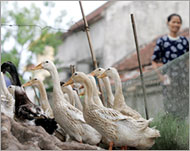Russia investigates mass bird deaths
Russian health workers have found mass bird deaths in a region west of the Ural mountains in what could become the first case of the deadly bird flu virus spreading to Europe.

But Russia‘s chief animal health official said a preliminary investigation had shown the deaths in Kalmykia might not have been caused by the dangerous virus that could kill humans.
The Russian state health watchdog, in a statement posted on its website on Wednesday, said the bird deaths occurred on a farm in the Caspian region of Kalmykia, 2000km from the region where Russia‘s first flu outbreak was reported.
“This case is being investigated,” the Federal Consumers’ Rights and Welfare Watchdog said, adding that no cases among humans had been confirmed in Russia.
Russia has tried to contain a bird flu outbreak since mid-July when the first case of the disease was registered in Siberia and later in neighbouring Kazakhstan and Mongolia.
Parasitic worms
There was no official word on what had caused the Kalmyk deaths, but Sergei Dankvert, chief animal and plant safety officer, said the birds might have died from an infection caused by parasitic worms.
 |
|
A mass death of ducks was |
“The result of a preliminary analysis has not confirmed the existence of bird flu in the village of Manych … in the republic,” he told Itar-Tass news agency.
Kalmykia is 1800km south of Moscow and is the only Buddhist region in Europe.
Separately, Interfax news agency reported that health officials were looking into mass deaths of ducks near a reservoir in the Sverdlovsk region, which borders a number of Urals regions hit by the virus.
The epidemic, officially identified in six Siberian regions, has yet to be confirmed on the western side of the Ural mountains separating Asia from Europe.
Officials fear migrating birds could export it to Western Europe, Africa and the Middle East over the coming months.
Village struck
Separately, Interfax news agency reported from the industrial region of Chelyabinsk, where officials confirmed the first case of the deadly H5N1 strain this week, that the virus had struck another village in the region – Barsuchye.
 |
|
The virus could mutate in humans |
In Kazakhstan, the Emergencies Ministry said the death of more than 120 birds in a northern village was due to avian influenza, the sixth location in the country where a bird flu outbreak has been recorded.
Although no humans have been infected in the Kazakh and Russian outbreaks, the H5N1 subtype of bird flu has killed more than 50 people in Asia since 2003.
The prospect of its spread has prompted warnings that the virus might mutate in humans and unleash a global influenza pandemic.
A message from the US embassy to Americans in Kazakhstan this week said the State Department was stockpiling an anti-viral medication, Tamiflu, to treat US government employees and their families at its embassies in southeast Asia.